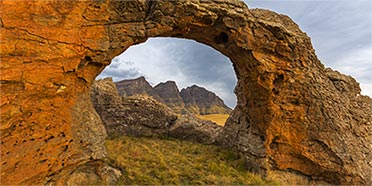- You are here:
- Home
- Countries & Parks
- Lesotho Parks
- Sehlabathebe National Park
- Reviews
- Expert Reviews
Expert Reviews – Sehlabathebe NP

Ariadne is a renowned African wildlife photographer whose work is featured in many well-known guidebooks and magazines.
1 person found this review helpful.
A giant’s playground of arches and rock pools
Set below the Drakensberg Mountains as it runs along the Lesotho–South Africa border, the park is a hiker’s paradise. You’ll love exploring the labyrinth of rock formations; most notable are the arches and sandstone pillars which offer endless photo opportunities. So do the rock pools reflecting ‘Devil’s Knuckles’, a trio of imposing peaks which dominate the landscape. Head out here early in the morning and the rising mist adds a touch of mystique to this magnificent scene. There isn’t a lot of wildlife, but you won’t miss big groups of hyrax sunbathing on the rocks. We also saw several pairs of grey rhebok and an inquisitive black-backed jackal trotting on the road. Sehlabathebe protects 65 rock art sites and visiting some of these could be a great challenge for keen explorers. However, one of the best-preserved panels is conveniently located just next to the main road through the park.

Dale is a multi-award-winning writer and photographer with more than 500 published magazine articles featured in magazines such as National Geographic, BBC Wildlife, Travel Africa, and CNN Travel.
A Mountain Adventure in the Saddle
The Sehlabathebe National Park, nestled within the vast Maloti-Drakensberg Transfrontier UNESCO world heritage site, is a paradise for intrepid hikers. As a frequent visitor, I've grown to love its alpine atmosphere, despite the inevitable throbbing feet and aching thighs that come with exploring its numerous trails. This park is incredibly mountainous, so expect both literal and metaphorical ups and downs.
On my latest excursion, I decided to give my aging legs a break and opted for a multiday horseback adventure starting in South Africa's Maseru district and ending in the rustic stone-hutted village of Thamathu, nestled high in Lesotho's craggy peaks. Over three days, we journeyed through Sehlabathebe, marveling at its geological wonders, such as bizarre formations resembling enormous granite mushrooms and gravity-defying arches. The park also boasts a stunning single-drop waterfall, inviting me to take a dip in the plunge pool below. It was breathtaking, both in terms of scenery and its Baltic-like temperature.
As we continued our journey, we ventured into steep-sided canyons where pure mountain streams gurgled and tumbled, and above us, bearded vultures glided effortlessly on invisible thermals. We also paused at numerous rocky overhangs adorned with ancient Bushman cave paintings, some estimated to be thousands of years old. They offered a glimpse into an ancient Stone Age era of a long-gone people who once hunted eland and antelope in these harsh yet beautiful mountains.

Philip is an acclaimed travel writer and author of many guidebooks, including the Bradt guides to Uganda, Tanzania, Kenya and South Africa.
A Giant’s Playground of Boulders & Rock Arches
Lesotho’s oldest national park, established in 1970, and incorporated into Unesco’s cross-border Maloti-Drakensberg World Heritage Site in 2008, doesn’t claim to be a conventional safari destination. But as one of the most remote conservation areas in southern Africa, 65km2/25mi2 Sehlabathebe does offer hikers and adventurous travellers a hard-to-beat combination of stunning mountain scenery and an isolated wilderness atmosphere.
Sehlabathebe’s most striking feature, about 30 minutes by car from the entrance gate, is a surreal giant’s playground of rock arches, natural dolmens and rock pools sculpted by the erosion of sandstone strata beneath harder igneous rocks. These formations are set below the Devil’s Knuckles, an imperious trio of prominent peaks that rise to above 3,000m/9,840ft on the border with South Africa.
There is some wildlife around. We encountered several pairs of grey rhebok, a twitchy white-tailed antelope endemic to South Africa, and also saw plenty of rock hyraxes sunning themselves on the rocks. More unexpected was an early morning encounter with a black-backed jackal as it trotted along the road, and while we didn’t see any eland or chacma baboon, our guide confirmed they are resident.
Bird-wise, Sehlabathebe is a good place to look out for Afromontane specials such as Cape vulture, jackal buzzard and Drakensberg siskin, while the rare bearded vulture (lammergeyer) breeds in the vicinity.
We visited the most accessible of the park’s 65 prehistoric rock art sites, a large and well-preserved panel that includes some clear depictions of elands, a herd of smaller antelope, and several human figures.
Sehlabathebe is not suited to conventional holidaymakers. It lies at least two hours from Qacha’s Nek (the closest town) along a rough 4x4-only road, and facilities are limited to self-catering chalets. But this remote scenic gem is highly recommended to those who enjoy off-the-beaten-track rambling, hiking and horse riding, and there’s a good chance you’ll have the run of the place to yourself.


 Lesotho Parks
Lesotho Parks